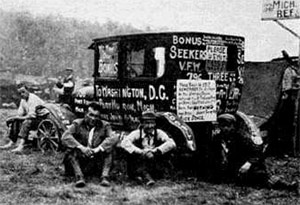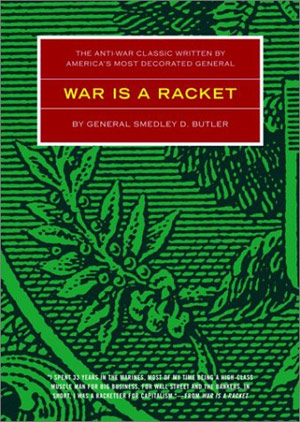Smedley
Darlington Butler knew war. A spare, gaunt man, he stares hollow-eyed
into the camera in old photos, as if he were still seeing in his
mind's eye the faces of boys whom he led to fight and die in China,
the Philippines, Latin America, Haiti, and wherever else foreign
policy and business interests led the United States to speak softly
and carry a big stick. Nor were his battles solely fought on foreign
soil: In the 1920s, Butler led a Prohibition-era campaign against
Philadelphia's speakeasies that resembled our latter-day modern
"war on drugs." A Marine since the age of sixteen, he
had won two Congressional Medals of Honor and one Marine Corps Brevet
medal for conspicuous gallantry and leadership under fire.
Odd,
then, that in his later years this man, known as one of the most-decorated
warriors ever to serve in the American military, should turn so
against war.
 In
the spring and summer of 1932, at the height of the Great Depression,
twenty thousand impoverished World War I veterans descended upon
Washington, D.C., begging the government to honor the cash bonuses
that had been promised them. The so-called "Bonus Army"
erected a "Hooverville" across the Potomac River, where
they slept under lean-tos made of newspaper, tin, bits of cardboard,
or whatever they could scrounge. Then-retired general Butler, whose
Quaker roots gave him a strong sense of social justice, addressed
the "troops," expressing his support for their cause.
Others in the military, however, were not as sympathetic: Under
the command of President Herbert Hoover, General Douglas Macarthur,
assisted by then-Major Dwight D. Eisenhower and George S. Patton,
used tanks and tear gas to flatten the Hooverville and rout the
Bonus Army. Three died, including an eleven-week-old-baby; thousands
more were injured by the gas.
In
the spring and summer of 1932, at the height of the Great Depression,
twenty thousand impoverished World War I veterans descended upon
Washington, D.C., begging the government to honor the cash bonuses
that had been promised them. The so-called "Bonus Army"
erected a "Hooverville" across the Potomac River, where
they slept under lean-tos made of newspaper, tin, bits of cardboard,
or whatever they could scrounge. Then-retired general Butler, whose
Quaker roots gave him a strong sense of social justice, addressed
the "troops," expressing his support for their cause.
Others in the military, however, were not as sympathetic: Under
the command of President Herbert Hoover, General Douglas Macarthur,
assisted by then-Major Dwight D. Eisenhower and George S. Patton,
used tanks and tear gas to flatten the Hooverville and rout the
Bonus Army. Three died, including an eleven-week-old-baby; thousands
more were injured by the gas.
The treatment
that Butler saw meted out to the homeless veterans of World War
I by the U.S. government was no different than that he had seen
dealt out to countless others of the poor and powerless. In 1935,
he remarked on his illustrious military career: "I helped make
Mexico, especially Tampico, safe for American oil interests in 1914.
I helped make Haiti and Cuba a decent place for the National City
Bank boys to collect revenues in. I helped in the raping of half
a dozen Central American republics for the benefits of Wall Street.
The record of racketeering is long. I helped purify Nicaragua for
the international banking house of Brown Brothers in 1909-1912.
I brought light to the Dominican Republic for American sugar interests
in 1916. In China I helped to see to it that Standard Oil went its
way unmolested." He had, in short, been the muscle for the
American government's mafia-style foreign policy.
Of course,
Haitians and Mexicans don't vote in the United States, and the Bonus
Army incident did little to endear President Hoover to the masses.
He was booted out in the 1932 election, and Franklin Delano Roosevelt
was replaced him. The new President immediately began making reforms,
including a whole-scale restructuring of the nation's economic infrastructure
and vast concessions to labor—changes that hardly endeared
him to Big Business. In 1934, Smedley Butler told a Congressional
committee that several Wall Street brokers, represented by one Gerald
C. MacGuire, had approached him, seeking his leadership for another
group of veterans to march on Washington—this time, an armed
force that would make it clear to Roosevelt that it was either Wall
Street's way or the highway. America had seen its own attempt at
a Fascist coup.
Why,
then, is this incident in U.S. history not better known? Why don't
children learn in school about the plot to seize the United States
government? The answer is obvious to anyone familiar with how the
American political system and press work. Those Butler accused treated
the affair as a joke, a "cocktail party" suggestion that
the uneducated, backwoods rube of a Marine had taken seriously.
The press was quick to turn on the general, as well: Time
magazine called his accusations a "plot without plotters,"
and the New York Times, after initially reporting the events
on the first page on November 21, 1934, buried them in the middle
of the newspaper on the 22nd—leading off the story with a denial
by MacGuire.
Nonetheless,
the battle lines were drawn. Butler had spent his life being an
attack dog for business, but in his later years, he turned around
and bit his masters in the ass. For him, Fascist strong-arm tactics
and capitalist strong-arm tactics were one and the same. Writing
of World War I, he said, "It has been estimated by statisticians
and economists and researchers that the war cost your Uncle Sam
$52,000,000,000. Of this sum, $39,000,000,000 was expended in the
actual war period. This expenditure yielded $16,000,000,000 in profits.
That is how the 21,000 billionaires and millionaires got that way.
This $16,000,000,000. . . . went to a very few." It was abundantly
clear that the men he had led had died for no other reason than
to line the pockets of those who would never have to fight themselves.
The parallels
between Butler's life and times and our own are obvious: Recession,
entanglement in foreign affairs, and business interests who have
realized that it is cheaper to buy Washington than to storm it.
For example, Halliburton, Vice President Cheney's former company,
has
won billions in uncontested contracts in Iraq. The slaves
in the war factories owned by those who cozied up to the Nazi elite
at least knew they were slaves and there was no hope for them. We,
on the other hand, are kept enmeshed in the system by a series of
false promises, encouraged to dream big as an opiate to mask our
true condition.
 The
time has obviously come for Smedley Butler to have his moment in
the sun. Adam Parfrey of Feral House, whose name is no doubt at
the top of John Ashcroft's "enemies" list, has bravely
reprinted Butler's War is a Racket, as well as his essays
"Common-Sense Neutrality" and "An Amendment for Peace,"
in which the general argues for a non-interventionist foreign policy.
Also included in the book are shocking photographs from The Horror
of It, a photographic essay on the ravages of World War I.
The
time has obviously come for Smedley Butler to have his moment in
the sun. Adam Parfrey of Feral House, whose name is no doubt at
the top of John Ashcroft's "enemies" list, has bravely
reprinted Butler's War is a Racket, as well as his essays
"Common-Sense Neutrality" and "An Amendment for Peace,"
in which the general argues for a non-interventionist foreign policy.
Also included in the book are shocking photographs from The Horror
of It, a photographic essay on the ravages of World War I.
Butler's
attack on the military-industrial complex does more than expose
war for the racket it is: It also gives the antiwar movement unmatched
credibility. The general's suggestions for reform are nothing a
modern dissident wouldn't agree with: Nationalizing the arms industry
that puts the profit in carnage, not allowing Congress to declare
war without conducting a national plebiscite of those who would
be asked to fight and die, and passing a Constitutional amendment
that limits U.S. military forces to home defense only. Though some
of his suggestions are dated (we now have an all-volunteer military,
and the President now regularly sends in troops without a Congressional
vote, which, incidentally, was a power of Roman emperors), others
are as applicable to a post-9/11 world as they were to a post-World
War I world.
Click
here to buy War is a Racket from the Feral House
Web site. And, while you're there, drop by the message boards and
give them a shout-out.